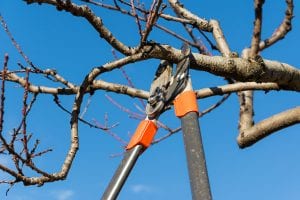3 Winter Landscaping Secrets To Keep Trees & Shrubs Healthy
As temperatures drop homeowners are finishing up winter landscaping projects around the yard, getting lawn, trees and shrubs prepared for the coming winter season. When outside chores are finished for the year, we tend to adopt an out-of-sight, out-of-mind mentality. However, before we check out for the winter, we have three winter landscaping secrets to keep in mind for our wooden plant material friends! Following these watering, mulching, and tree trimming and pruning guidelines this winter will protect your landscape during the colder months. And they can also protect your wallet!
Secret #1 – Winter Watering Is Ideal
Did you know you should water your trees and plants throughout the winter? With almost a decade under my belt, I can say I see more drought damage on plants coming out of winter and into spring than during the summer months. Freezing temperatures and the relatively low moisture content in snow leave plants with the inability to access the resources they need the most. Although plants reduce their water consumption through winter, evergreens continue to use their foliage year-round. Even the roots of deciduous trees who lose all their leaves continue to take in water. Taking advantage of a mild day once or twice a month to give your landscape or targeted plants a good soak can go a long way in keeping them healthy and happy.
Secret #2 – Adding Mulch To Trees & Shrubs Will Protect Them
Some of the tricks you always use during the summer can be applied just as successful during the winter! A good mulching can improve landscape appearances, reduce weed pressure and help retain soil moisture during the year. Mulch has these effects during winter as well, helping with the issue of drought stress. Late fall and early winter are when trees and shrubs do most of their root recovery from the year and develop new roots for the next. A good mulch layer can also extend the time a woody plant has to do this by acting as an insulator for soil temperature. A good mulch layer should be 3 to 4 inches thick, extending to at least the edge of the canopy of the plant. To prevent various issues, a 1-inch gap in mulch coverage should be left between the stem of the plant and any mulch.
Secret #3 – Prune Trees & Shrubs In The Winter
It may seem strange to start cutting the bare branches of your trees and shrubs, but winter is actually the best time to prune
most trees and many shrubs. There are a few varieties of trees and shrubs that should not be pruned during winter. An arborist should be able to help you identify these plants. Without leaves, you can more easily identify and fix any structural issues. Also, most experienced tree climbers can easily identify and remove dead wood, even with the foliage gone. Like taking a family trip during the offseason, winter tree pruning can also help save you money. Many tree companies offer discounted work seeking to stay busy during a time when most people have forgotten about the services they provide. Here are some basic tree and shrub pruning tips:
- Trim all of the dead and diseased branches from your trees first.
- Trim and remove all unwanted lower branches on your evergreen shrubs and trees in late winter.
- Don’t forget to trim any overgrown or small branches in your trees. This will open your tree up to increased light and air.
- Work toward maintaining the tree’s structure.
- If you’re attempting to trim your trees and plants yourself, be sure to cut the branches at the node, the point at which one branch or twig attaches to another.
By keeping these tips in mind, it is easier to keep your outdoor investments happy and avoid adding to the already long list of spring-time chores. Winter pruning and tree trimming can also give you the opportunity to take care of much-needed winter landscape maintenance at a more affordable price! If you’re interested in winter tree trimming or pruning of your trees and shrubs call 855.216.2293 or reach out to our Kansas City, St. Louis, Wichita, Springfield or Tulsa locations. You can also request a tree trimming estimate by completing this form. Ryan Lawn & Tree also offers tree removal and stump grinding. Your RYAN Pros are happy to answer any questions you have.
Dane Kietzman is a seven-year professional ISA Certified Arborist with Ryan Lawn and Tree, currently serving as Team Lead for the Plant Healthcare Department out of Overland Park. Kietzman has a bachelor’s degree in Park Management and Conservation from Kansas State University with eight years in green industry experience since graduating in 2011.










